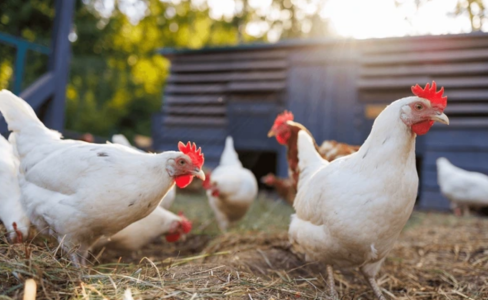What did this Aussie granddad do to a chicken at a wildlife park? The answer will shock you!
By
- Replies 23
In a shocking incident that has left animal lovers and park staff distressed, an Australian grandfather committed an act of cruelty that has sparked widespread condemnation. Peter Smith, a 58-year-old grandfather, was handed a non-custodial sentence after he was found guilty of aggravated animal cruelty at a wildlife park in the NSW Hunter region.
The incident occurred at Oakvale Wildlife Park in Salt Ash, where Smith, in what the magistrate described as an act of 'sadism', grabbed a beloved chicken named Betty White from its enclosure and threw it into an alligator pen. The white Chinese silkie bantam chook, which was hand-raised and part of the park's breeding program, was killed instantly by one of the alligators as Smith watched on.
Magistrate Justin Peach, presiding over the case at Raymond Terrace Local Court, expressed his view that Smith's actions were sadistic. Visibly shaking as the sentence was handed down, Smith was ordered to serve a nine-month intensive correction order and perform 100 hours of community service.
The grandfather had pleaded guilty to the charge but claimed he intended to feed the chicken to an alligator because it looked hungry. His defence lawyer, Bryan Wrench, argued that Smith had become desensitised to chickens, viewing them merely as a food source due to his upbringing on a farm where he used to catch and kill animals for consumption. Wrench also pointed out that more than a million chickens are killed each year for food and that Betty White had not been tortured or maimed, dying instantly.
However, the magistrate dismissed the defence's argument, emphasising that Betty White was a much-loved domesticated chicken used in the park's breeding program. The psychological report presented in court revealed that Smith came from a good family and was a member of a religious community with a strong moral code. Yet, the magistrate noted that Smith's attitude towards domestic animals required significant introspection.
The incident has raised questions about the treatment of animals and the responsibilities of visitors at wildlife parks. It serves as a stark reminder that wildlife parks are sanctuaries for animals, where they should be respected and protected. The staff at Oakvale Wildlife Park were understandably upset over the loss of Betty White, who was more than just a chicken; she was a part of their park family.
As members of the Seniors Discount Club, we understand the importance of respecting all living creatures and the natural environments we share with them. This story is a cautionary tale that highlights the need for empathy and responsible behaviour towards animals, regardless of whether they are in the wild, on a farm, or within the protected confines of a wildlife park.

We invite our readers to reflect on this incident and share their thoughts on the importance of animal welfare and the role of education in preventing such acts of cruelty. Have you visited a wildlife park recently? How do you feel about the treatment of animals in such settings? Let us know in the comments below.
The incident occurred at Oakvale Wildlife Park in Salt Ash, where Smith, in what the magistrate described as an act of 'sadism', grabbed a beloved chicken named Betty White from its enclosure and threw it into an alligator pen. The white Chinese silkie bantam chook, which was hand-raised and part of the park's breeding program, was killed instantly by one of the alligators as Smith watched on.
Magistrate Justin Peach, presiding over the case at Raymond Terrace Local Court, expressed his view that Smith's actions were sadistic. Visibly shaking as the sentence was handed down, Smith was ordered to serve a nine-month intensive correction order and perform 100 hours of community service.
The grandfather had pleaded guilty to the charge but claimed he intended to feed the chicken to an alligator because it looked hungry. His defence lawyer, Bryan Wrench, argued that Smith had become desensitised to chickens, viewing them merely as a food source due to his upbringing on a farm where he used to catch and kill animals for consumption. Wrench also pointed out that more than a million chickens are killed each year for food and that Betty White had not been tortured or maimed, dying instantly.
However, the magistrate dismissed the defence's argument, emphasising that Betty White was a much-loved domesticated chicken used in the park's breeding program. The psychological report presented in court revealed that Smith came from a good family and was a member of a religious community with a strong moral code. Yet, the magistrate noted that Smith's attitude towards domestic animals required significant introspection.
The incident has raised questions about the treatment of animals and the responsibilities of visitors at wildlife parks. It serves as a stark reminder that wildlife parks are sanctuaries for animals, where they should be respected and protected. The staff at Oakvale Wildlife Park were understandably upset over the loss of Betty White, who was more than just a chicken; she was a part of their park family.
As members of the Seniors Discount Club, we understand the importance of respecting all living creatures and the natural environments we share with them. This story is a cautionary tale that highlights the need for empathy and responsible behaviour towards animals, regardless of whether they are in the wild, on a farm, or within the protected confines of a wildlife park.
Key Takeaways
- Peter Smith has received a non-custodial sentence after throwing a much-loved chicken into an alligator enclosure at a wildlife park for his own amusement.
- He has been ordered to serve a nine-month intensive correction order and complete 100 hours of community service for aggravated animal cruelty.
- The incident occurred at Oakvale Wildlife Park, where Smith grabbed the domesticated chicken, known as Betty White, and fed it to the alligators.
- The magistrate condemned the act of 'sadism’, and the defence argument attempting to shift blame to the alligator was dismissed.
We invite our readers to reflect on this incident and share their thoughts on the importance of animal welfare and the role of education in preventing such acts of cruelty. Have you visited a wildlife park recently? How do you feel about the treatment of animals in such settings? Let us know in the comments below.










